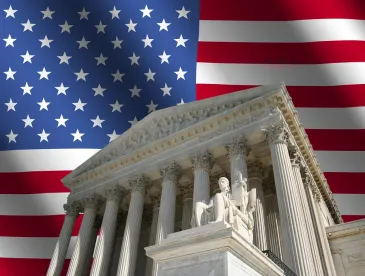The Supreme Court arguments in USPTO v. Booking.com B.V.[1] on May 4, 2020, marked a historic first: the Supreme Court held oral arguments remotely, by telephone. As a result, lawyers and Supreme Court enthusiasts were able to listen to the argument in real time. Further, both the Petitioner USPTO and the Respondent Booking.com were represented by women attorneys, a rare occurrence before the Supreme Court. The remote argument proceeded in an orderly manner, with the nine justices – including often-taciturn Justice Thomas – questioning the advocates in order of seniority. All parties were respectful of the time constraints, and no yapping puppies (or flushing toilets) were heard in the remote backgrounds.
The issue before the Court was whether BOOKING.COM is a generic term and thus ineligible for trademark protection, or whether it has become “distinctive” due to its association with the online resource and thus qualifies for registration. Booking.com had filed four trademark applications for BOOKING.COM — one for the word mark and three for stylized versions of the word. Applying well-settled law that generic terms cannot be protected as trademarks, the USPTO Trademark Examiner refused all four applications on the ground that combining two generic terms – “.com” with “booking” – did not result in a protectable mark. Booking.com’s arguments that the entire term should not be viewed as generic and had become distinctive as a result of its use were rejected.
The Trademark Trial and Appeal Board of the USPTO affirmed the Trademark Examiner’s refusal to register BOOKING.COM. However, Booking.com found a more receptive forum when it took the issue to federal district court, which is an option for trademark applicants dissatisfied with a TTAB ruling. The District Court ruled for Booking.com, concluding that BOOKING.COM was a protectable mark.[2] The Court held that, even though “booking” was a generic term and “.com” denoted a Top Level Domain (TLD), BOOKING.COM as a whole was a descriptive mark and had become associated with the online service. The Fourth Circuit Court of Appeals affirmed,[3] and the USPTO’s petition for a writ of certiorari to the Supreme Court was granted in November 2019.
After considering the parties’ briefs and a whopping fifteen amicus briefs – one for petitioner, twelve for respondent, and two neutral – the Supreme Court agreed to review the question of whether adding a generic Top Level Domain to an otherwise generic term could create a protectable trademark.
At oral argument, the USPTO largely relied on Goodyear’s India Rubber Glove Mfg. v. Goodyear Rubber Co.,[4] an 1888 ruling in which the Supreme Court held that the addition of a term like “Company” or “Inc.” was insufficient to make a term descriptive rather than generic. The government also raised concerns about whether allowing registrants to monopolize certain terms would harm competition — for example, whether Booking.com would be able to use a trademark registration to combat competitors such as (hypothetically) hotelbooking.com.
Booking.com argued that survey and other evidence showed that consumers strongly identified BOOKING.COM with the company’s services – which, it submitted, was a critical issue under the federal Lanham Act. Booking.com also cited concerns about harm from third-party spoofing and typo-squatting, and argued that it could not sufficiently combat such harmful behaviors without a registered trademark.
The Justices’ questions largely focused on three issues: (i) the potential for abuse by granting monopolies in the guise of trademarks, (ii) comparisons to other acceptable forms of registered marks – such as phone numbers or addresses, and (iii) whether the over-100-year-old pre-Lanham Act Goodyear case should apply to trademark registrations in the Internet era.
While the Court’s decision is several months away, this case has the potential to open up a new era of .com and other trademark registrations. Lisa Blatt, the attorney advocating for Booking.com, noted that WEATHER.COM is already a registered trademark. To date, however, there are relatively few US trademark registrations of Generic Word + TLD marks. A favorable decision for Booking.com might also reshape trademark law by acknowledging that at least some generic terms can be protected as trademarks if they attain sufficient “secondary meaning” or consumer recognition that the terms designate a particular source of goods or services.
The Takeaway: Whichever way the Court rules, this case shows that the US Supreme Court is “bookin’ it” and adapting well to remote technology, despite the disruption caused by the coronavirus pandemic.
[1] S. Ct. Docket No. 19-46; see https://www.supremecourt.gov/search.aspx?filename=/docket/docketfiles/html/public/19-46.html.
[2] Booking.com v. Matal, 278 F. Supp. 3d 891 (E.D. Va. 2017).
[3] Booking.com v. USPTO, 915 F.3d 171 (4th Cir. 2019).
[4] 128 U.S. 598 (1888).





 />i
/>i
